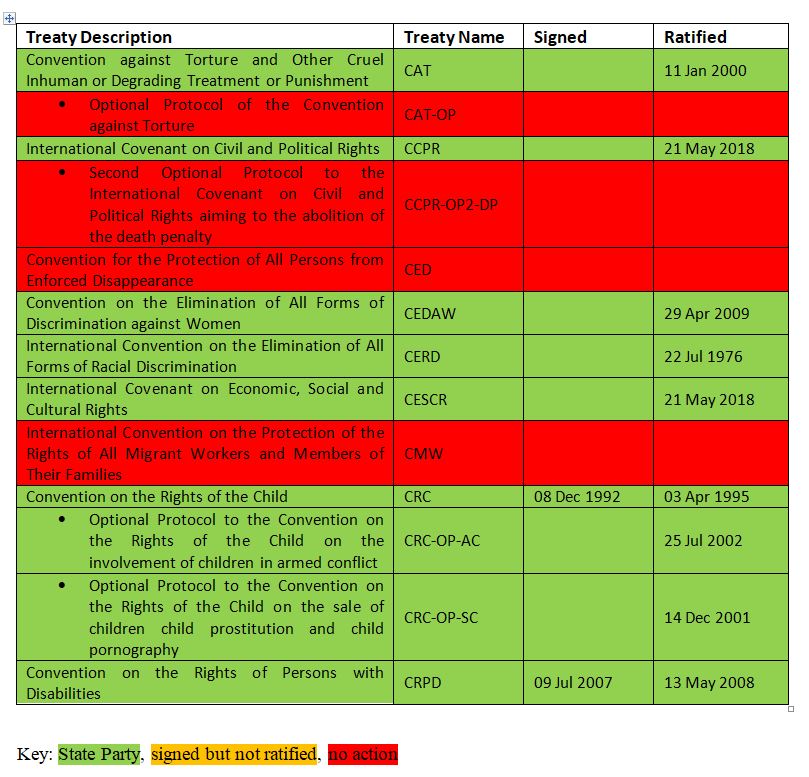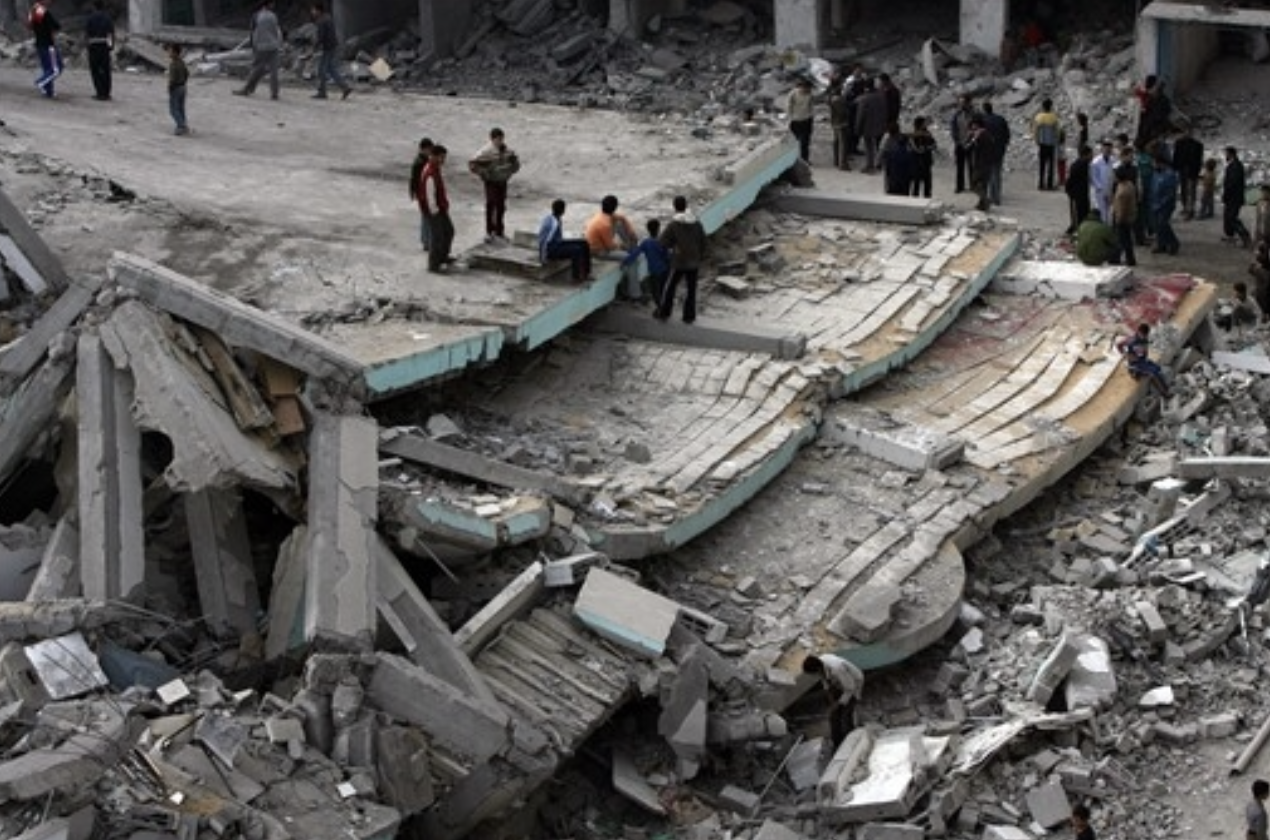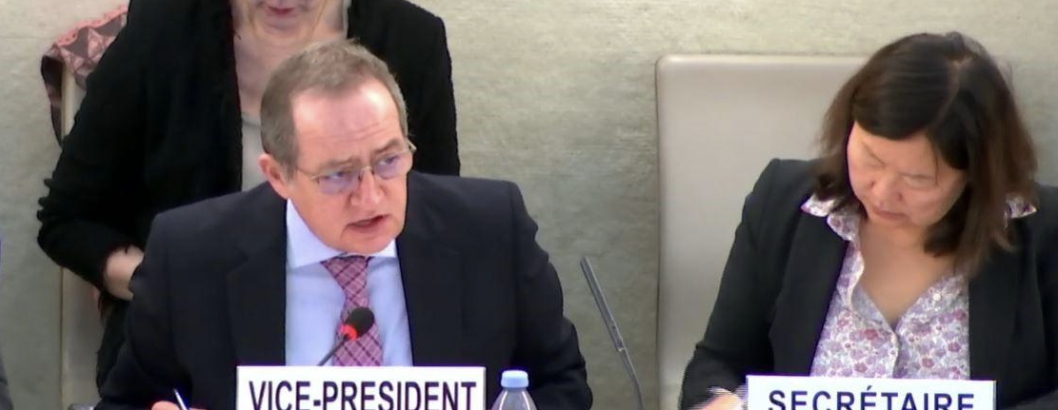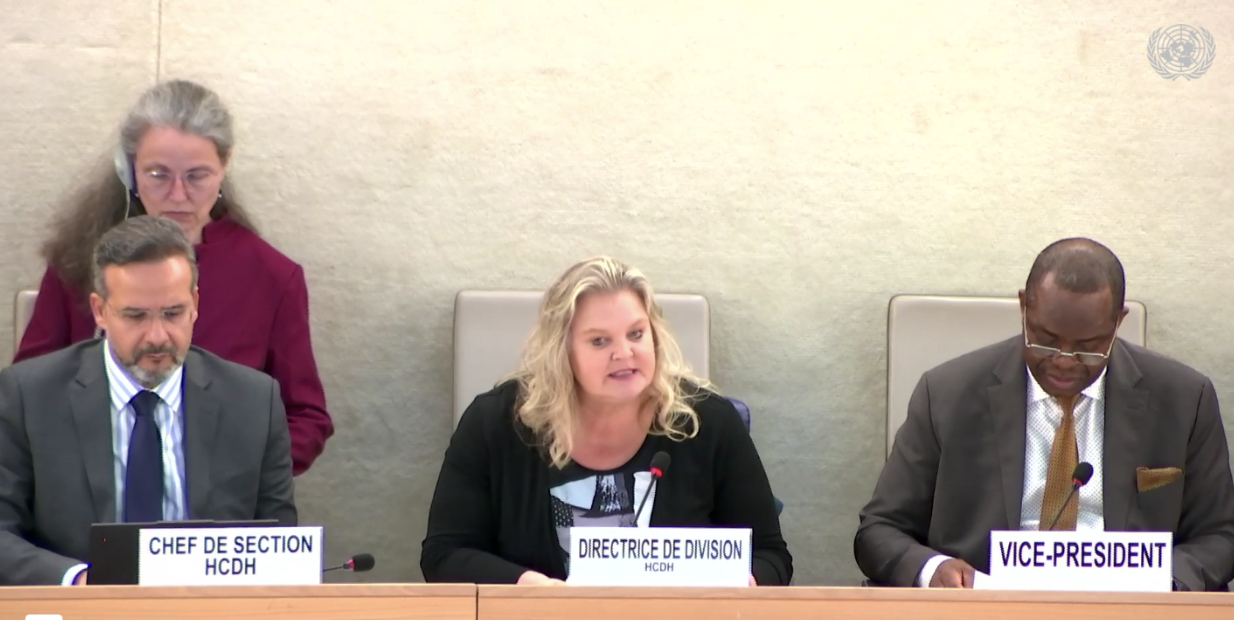05 June 2019
By: Benedetta Viti

The third cycle of Qatar’s review began with a presentation of the National Report by H.E. Mr. Soltan Bin Saad Al-Muraikhi, State Minister for Foreign Affairs of Qatar, who emphasized that in the context of Qatar National Vision 2030, the State is eager to pursue international cooperation, and to fulfil its international obligations. Between the strategies and policies adopted to promote and protect human rights, interesting achievements have been made for the protection of the rights of migrant workers and domestic workers, in accordance with the provision of the International Labour Organization (ILO) Domestic Workers Convention. Between the topics under discussion, the improvements in women and children education, the rights of persons with disabilities, national security and counter-terrorism laws. After the National Report, the session proceeded with an interactive dialogue, during which 104 delegations made statements and offered recommendations for human rights improvements. Several states commended the efforts made by Qatar, particularly in the improvement of the rights of migrant workers, in fighting human trafficking, and for including the environment in the National Vision 2030. However, concerns were raised about women rights, freedom of expression, death penalty, and the funding of terrorist groups. Qatar delegation replied to various points raised by Member States and ended the discussions with some observations.
At its meeting on 17 May 2019, the Working Group adopted the report on Qatar. The recommendations will be examined by Qatar, which will provide responses in due time, but no later than the forty-second session of the Human Rights Council.
The full report of Qatar’s third UPR process includes:
- Presentation of the National Report
- Interactive Dialogue and Recommendations from States
- Background information
- Qatar’s Participation in International Human Rights Treaties
- Summary of UN Documentation and Stakeholder Submissions.
Presentation of the National Report
H.E. Mr. Soltan Bin Saad Al-Muraikhi, State Minister for Foreign Affairs of Qatar opened the session emphasizing that in the context of the Qatar National Vision 2030, the State is eager to pursue international cooperation, to contribute constructively to international peace and security and to fulfil its international obligations. The most important goals in the field of international cooperation are: promoting the economic, political and cultural role of Qatar at the regional and global levels, promoting cultural exchanges with other Arab States and with other countries in general; contributing to building international peace and security through political initiatives and aid for developmental and humanitarian purposes. Qatar understands the importance of international cooperation for both national and international development and has therefore introduced a strategic plan on international cooperation into its Second National Development Strategy 2018-2022.
Between the strategies and policies adopted to promote and protect human rights, significant achievements have been made for the protection of the rights of migrant workers, which include the introduction of a wage protection system that stipulates that wages are to be paid into the account of the worker, the abolition of the kafalah system and its replacement with a working relationship based on a contract of work, and the new Act that regulates the relationship between domestic workers and their employers, in accordance with the provisions of the International Labour Organization (ILO) Domestic Workers Convention.
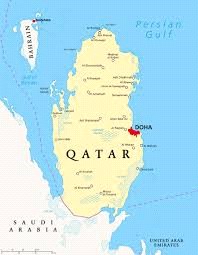
H.E. Mr. Al-Muraikhi reiterated the full support and cooperation of the State of Qatar to the work of the UPR. Since submitting its second national report to the universal periodic review mechanism, Qatar has acceded to a number of international instruments, among them the International Covenant on Civil and Political Rights, under Decree No. 40 of 2018, the International Covenant on Economic, Social and Cultural Rights, under Decree No. 41 of 2018, and the International Convention for the Suppression of the Financing of Terrorism of 1999, under Decree No. 20 of 2018.
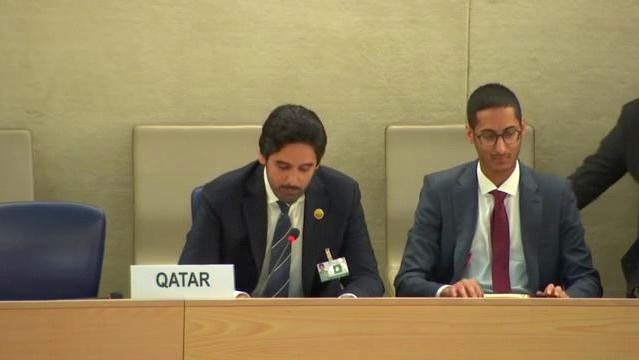
UPR 33, 6 May to 17 May 2019, Source: UN Web TV
Interactive Dialogue and Recommendations from States
The session was opened by Fiji that welcomed the National Vision of Qatar 2030 which incapsulate the environment in the rapid domestic expansion of the country and ensure harmony between economic growth, social development and environmental protection. In particular, Fiji recommended to give particular attention to environmental challenges including climate change mitigation, and to improve the participation and inclusion of women, children and persons with disabilities.
The session continued with the intervention of France that focused in particular on the rights of migrant workers, women education, laws and regulations related to the labour market, and the major response that Qatar has given to the embargo imposed to the country on 2017. Between the recommendations made by France, to be mentioned the abolition of the sponsorship system on migrant workers, the laws on freedom of expression and opinion, the association of press, the reduction of the gap between men and women, and the guarantee of the rights of the LGBT group.
India and Indonesia instead focused their intervention on the improvement of the legislation of migrant workers and domestic workers and the legislations that aim at preventing abuses and exploitation of migrant workers, especially women. Iraq appreciated the developments that took place in the field of human rights since the second UPR and praised the accession of Qatar to several international conventions and the ratification of legislations related to human right, economic development and social programs. Wishing Qatar full success, Iran acknowledged the resilience showed by Qatar in the field of international, social and cultural rights, encouraged Qatar to continue the process of improving legal measures for persons with disabilities and the advancement of the human rights for migrant workers, and made recommendations on matters related to the equal education for both sexes, and programs that aim at ending all forms of domestic violence.
With its intervention, Italy particularly appreciated the access of Qatar to the International Covenant on Economic, Social and Cultural Rights, and the commitment of Qatari authorities to fight against human trafficking as well as the measures aiming at improving the conditions of migrant workers. Italy encouraged Qatar to consider the adoption of a moratorium with a view to abolish death penalty, together with reforms aiming at improving the condition of migrants and foreign workers, to abolish exit visas for domestic workers, and adopt measures to prevent discrimination against women in law and practice. Between other interventions, Norway encouraged the implementation of a legal protection to improve the condition of domestic workers, including mechanisms for complaints and sanctions for violations, together with the legal rights and protection of women, freedom of religion and beliefs for its citizens. Kuwait noted the achievement of Qatar in the protection of human rights especially since the 2nd UPR cycle and recommended Qatar continue its efforts to strengthen human rights. Lebanon praised the achievements in the environmental and health sectors, the promotion of migrant workers, women and children. Morocco was pleased with the efforts made for the promotion of human rights, protection of women and children and the strengthening of international development cooperation. Switzerland commended Qatar for the abolition of the kafala system and the ratification of the ILO Convention. The Syrian Arab Republic encouraged Qatar to take proper measures to respect laws to combat terrorism and laws that are consistent to the International standards, prohibit human trafficking and establish separation between legislative and executive powers.
Finally, the intervention of Saudi Arabia was particularly interesting, as the two Gulf countries remain locked in a bitter diplomatic dispute. The Kingdom asked Qatar to take every necessary measure to restore the nationality of Al Ghufran tribe members by implementing the principle of equality of citizens before law, and to restore the Al Ghufran tribe possessions whose nationality has been withdrawn and property confiscated. Moreover, it encouraged the neighbour country to take proper measure to put an end to the funding of terrorist groups, not providing them media platforms and platforms to disseminate extremist ideas, and finally to get rid of all obstacles and restrictions for its residents to perform the Hajj Pilgrimage and the Umrah.
The Qatar delegation was thankful for the open and inclusive process and responded to a number of issues and questions, many of which are summarized below.
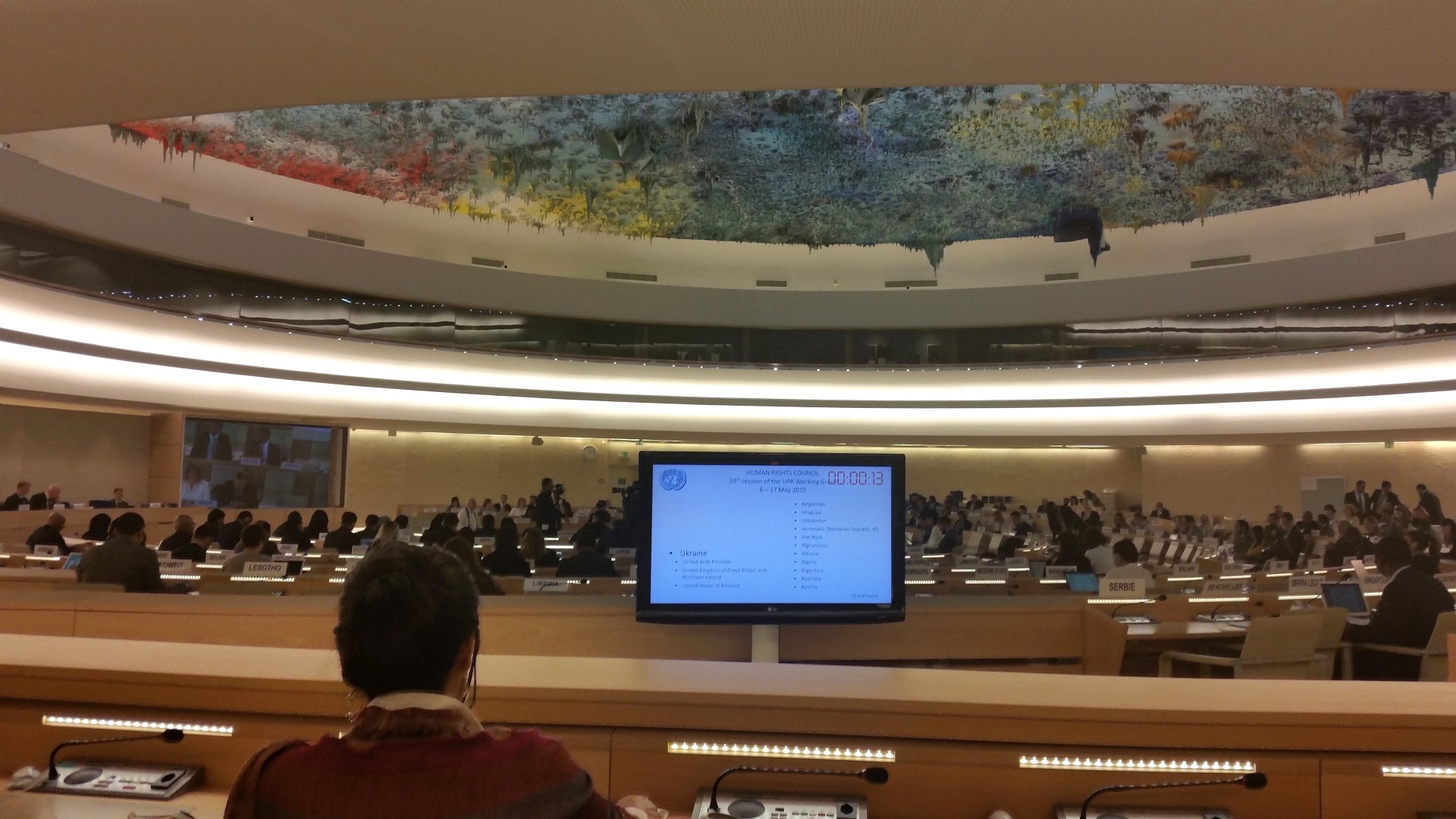
Qatar’s UPR, Room XX of the Palais des Nations, Source: GICJ
Protection of the rights of migrant workers : The State has continued to review its legislation relative to the protection and promotion of the rights of migrant workers, introducing a “wage protection system”, the abolition of the restriction regulating the entry, departure and residency of migrant workers, and freedom to change employer, which led to the abolishment of the kafalah system.
Protection of the rights of women and children against violence, including domestic violence: Qatar has continued its policy of combating all forms of domestic violence against women and children, including violence against domestic workers. The Hamad Medical Corporation has adopted policies to address the problem of violence against women and imposes an obligation on medical staff to report suspected cases of violence.
Women rights : National legislations have been enacted in recent years reflecting the concern of the State authorities to promote the rights of women, to eliminate discrimination between women and men, and to establish rules governing gender equality. Legislation regulating the labour market in Qatar aimed at empowering women and enable equal women wages.
Combating human trafficking: Qatar adopted a national plan to combat human trafficking, developing a database of international legislation, and cooperating with Interpol.
Persons with disabilities: The State has adopted several plans for persons with disabilities, most recently the national autism strategy 2017–2021, and a digital inclusion strategy with a view to investing in communications technology as a way to achieve independence.
Family Counselling: Qatar opened some family centres, like the Wifaq Centre that seeks to reduce the negative effects of divorce on women and children and address situations of family violence.
Health and education: Qatar has continued its efforts to improve legislation on the right to health and to ensure universal access to health-care services, without discrimination. Some efforts of inclusion have been made for the access to education of women and persons with disabilities.
Freedom of expression: Qatar works to promote freedom of expression. A new law has also passed against cybercrime and pornographic material using children.
The session concluded with the intervention of the Ministry of Labour and Social Development that provided some final remarks. He expressed his commitment to accept all recommendation on payments of salaries with no delay, and inspections for small and medium enterprises to protect the rights of employees. He talked about the Agreement from 2018 to 2020 on health and safety provisions and on recruitment conditions. He mentioned the improvement of the system of monitoring and cooperation with ILO, particularly in the prevention of forced labour, the improvement of complaint mechanisms and combating human trafficking and abuse of domestic workers. He expressed the intention of the State to fully reform the labour sector, in cooperation with several international bodies, between them the International Federation for construction workers and ILO.
With a final greeting, the State Secretary thanked all the countries that made statements and recommendations and reiterated that intention of Qatar to take them into account in support with the objectives of the Council.
Background Information
To prepare for the review, the Working Group received two reports compiled by the OHCHR. One gave an overview of the reports of UN treaty bodies, special procedures and other relevant UN documents pertaining to human rights in Qatar (A/HRC/WG.6/33/QAT/2). The other report was a summary of 16 stakeholders’ submissions on Qatar related to the UPR process (A/HRC/WG.6/33/QAT/3). A separate section is provided for the contribution by the national human rights institution that is accredited in full compliance with the Paris Principles.
Qatar’s Participation in International Human Rights Treaties
Summary of UN Documentation and Stakeholder Submissions
Scope of international obligations and cooperation with international human rights mechanisms and bodies
Several treaty bodies and other stakeholders, including the Special Rapporteur on the human rights of migrants recommended that Qatar ratify the International Convention on the Protection of the Rights of All Migrant Workers and Members of Their Families and the Optional Protocol to the Convention against Torture and Other Cruel, Inhuman or Degrading Treatment or Punishment, and that it establish a national preventive mechanism with a mandate to undertake unannounced visits to all places where migrants were deprived of their liberty. In 2014, the Committee on the Elimination of Discrimination against Women called on Qatar to withdraw its reservations to articles 9 (2), 15 (1) and (4), and especially those to articles 2 and 16 (1), of the Convention on the Elimination of All Forms of Discrimination against Women. Amnesty International (AI) expressed concern over the government’s sweeping reservations. Through lodging these reservations, Qatar has refused to fully recognize equal rights for women, including in matters of personal status laws, and has also stated that it will interpret the term “punishment” in line with the Islamic Shari’a. The Special Rapporteur on the human rights of migrants recommended that Qatar ratify a number of International Labour Organization (ILO) conventions, including the Migration for Employment Convention (Revised), 1949 (No. 97).
National human rights framework
The Committee on the Rights of Persons with Disabilities recommended that Qatar, in consultation with persons with disabilities and their representative organizations, adopt all measures necessary to ensure the full compliance of its legislation with the general principles and specific provisions in the Convention on the Rights of Persons with Disabilities. The Committee on the Elimination of Discrimination against Women recommended that Qatar clarify the status of the Convention on the Elimination of All Forms of Discrimination against Women in its domestic legal order and ensure the precedence of its provisions over national laws in cases of conflict. A joint committee noted that, despite having been granted an “A” status by the Global Alliance of National Human Rights Institutions Sub-Committee on Accreditation in 2015, Qatar’s National Human Rights Institution – the National Human Rights Committee (NHRC) – was not in full compliance with the Paris Principles and that it was insufficiently independent of the executive. The NHRC was established and reorganised in 2010 by Emiri decrees, and the nomination, appointment and dismissal of its members has been subject to approval by the Emir. The NHRC is entirely financed by the state and the executive retains the power to both allocate funds to the institution and decide on its expenses.
Implementation of international human rights obligations, taking into account applicable international humanitarian law
Cross-Cutting Issues
Equality and non-discrimination
A UN Committee recommended that Qatar amend its laws to allow Qatari women married to non-citizens to transmit their nationality to their children from birth, without discrimination. Some stakeholders stated that the dominant perception among foreigners residing in Qatar was that the courts did not treat Qataris in an equal manner; and that the treatment might vary depending on the nationality of the person or his or her economic or work status in the country. According to Amnesty International (AI) laws that discriminate against women came particularly to the fore in the context of the Gulf crisis that began in June 2017, when some governments severely restricted ties with Qatar as part of a political dispute. In line with citizenship and family laws across the Gulf Cooperation Council (GCC), the children of Qatari mothers and non-Qatari fathers are not automatically entitled to citizenship. So, when some countries called their nationals back from Qatar and prevented Qatari nationals from entering their territory many families were split up.
Human rights and counter-terrorism
The Committee against Torture urged Qatar to review without delay its existing national security and counter-terrorism laws in order to bring its legislation into conformity with the Convention against Torture and other international standards. In particular, it called on Qatar to ensure that: all detainees, including those held under security laws, were informed about the charges against them; that detainees taken into custody were permitted to contact family members, lawyers and independent doctors; that no one was held in secret detention; and that solitary confinement was only used in exceptional cases, in accordance with rules 43 to 46 of the United Nations Standard Minimum Rules for the Treatment of Prisoners (the Nelson Mandela Rules).
A Joint UN Committee noted that Qatari counter-terrorism legislation lacked legal certainty and allowed for derogation from fundamental safeguards enshrined in the Code of Criminal Procedure. The Law on Combating Terrorism (as amended in 2017) defines terrorism in overly broad terms. In addition, Article 18 states that an individual can be held in “precautionary detention” for a period of up to six months upon the decision of the public prosecutor. Another committee recommended that Qatar bring counter-terrorism and national security legislation into line with international standards, particularly in relation to the definition of terrorism and the length of custody and pre-trial detention.
Civil and Political Rights
Right to life, liberty and security of person
UN Committees noted that although Qatar has maintained a de facto moratorium on the imposition of the death penalty since its last reported execution in 2003, courts in Qatar have continued to sentence people to death, as recently as June 2018. Another committee recommended that Qatar immediately adopt a formal moratorium on the death penalty; that it commutes all existing death sentences, and initiate a public dialogue regarding the death penalty, with a view toward its abolition.
In 2018, the Committee against Torture stated that Qatar should unambiguously reaffirm the absolute prohibition of torture and recommended that the legislation of Qatar reflect the absolute prohibition of torture, in accordance with article 2 of the Convention against Torture. The Committee further recommended that Qatar ensure in practice that confessions obtained by means of torture or ill-treatment were ruled inadmissible.
Administration of justice, including impunity, and the rule of law
In 2014, following a country visit to Qatar, the Special Rapporteur on the independence of judges and lawyers noted that, while any direct interference in the independence of judges was extremely difficult to document, reports of pressure being exerted by the executive on the work of the judiciary, particularly in cases involving powerful persons, was a matter of concern. For instance, in 2009, 33 Qatari judges had reportedly tendered their resignation to protest what they described as continued interference in their work.
Fundamental freedoms
Several UN committees recommended that Qatar review the 1979 Press and Publications Law, Penal Code and Cybercrime Law in order to ensure that this legislation is in line with best practices and international standards in the area of the freedom of expression.
Prohibition of all forms of slavery
The Committee against Torture called on Qatar to intensify its efforts to prevent and combat trafficking in human beings, including by implementing effectively the Law on Combating Trafficking in Persons.
Economic, Social and Cultural Rights
Right to work and to just and favourable conditions of work
ILO welcomed the establishment of an ILO project office in Qatar to support the implementation of a comprehensive three-year cooperation programme on working conditions and labour rights in the country.
The Special Rapporteur on the human rights of migrants called on Qatar to ensure that there was no discrimination in relation to salaries based on the nationality of workers and to consider establishing a minimum wage.
Right to education
Some UN Committees encouraged Qatar to continue to reiterate efforts to ensure that children learned and achieved equally, regardless of their economic and social background. Moreover, it encouraged Qatar to achieve gender equality in education and adopt a relevant strategy to promote women’s access to all areas of study and ensure equal career opportunities.
Rights of Specific Persons or Groups
Women
The Committee on the Elimination of Discrimination against Women recommended that Qatar adopt and implement temporary special measures, including quotas or preferential treatment, directed towards the achievement of substantive equality between women and men in areas where women were underrepresented or disadvantaged, including in political life, decision-making bodies and the private sector. The Committee also recommended that Qatar take special attention towards the rights of women migrant and domestic workers.
Despite promises in recent years by the government, several NGOs noted that there is still no law criminalizing domestic violence, and that personal status laws continued to discriminate against women in relation to marriage, divorce, inheritance, child custody, nationality and freedom of movement.
The Committee on the Rights of Persons with Disabilities recommended that Qatar conduct awareness-raising campaigns and education programmes at all levels, particularly targeted at the family level, in order to foster respect for the rights and dignity of women and girls with disabilities.
Children
The Committee on the Rights of the Child urged Qatar to explicitly prohibit corporal punishment in all settings, including at home, in schools and in the justice system, without any exception, and ensure that the prohibition of corporal punishment was adequately monitored and enforced.
The Committee on the Rights of Persons with Disabilities recommended that Qatar promote the realization of the rights of the child for girls and boys with disabilities on an equal basis with others, and provide adequate support for girls and boys with disabilities to help them start an independent life when they reached adulthood.
UNHCR commended the Government of Qatar for its support in establishing and ensuring the functioning of a school dedicated to Syrian refugee children. The school had opened in 2014 and provided tuition to 280 Syrian refugee children free of charge.
Persons with disabilities
The Committee on the Rights of Persons with Disabilities recommended that Qatar provide training on the concept of non-discrimination concerning persons with disabilities to public and private actors, together with incorporating an explicit prohibition of disability-based discrimination in its national legislation.
Migrants, refugees and asylum seekers
Following a country visit to Qatar in 2014, the Special Rapporteur on the human rights of migrants noted that the increasing numbers of migrants created unprecedented challenges for the country but encouraged Qatar to increase prevention of human rights abuses against migrants. However, he commended the country efforts in advancing human rights of migrants, in particular through improvements introduced to the Sponsorship Law of 2009.
UNHCR noted that under the existing system, refugees and asylum seekers were considered expatriates subject to the kafalah system. As such, their enjoyment of human rights was made dependent on sponsorship of their residency by an employer. UNHCR urged Qatar to implement the new law on political asylum and ensure its wide dissemination throughout the country and to comply with and ensure full respect for the principle of non-refoulement.
Stateless persons
The Committee on the Rights of the Child recommended that Qatar review its legislation on nationality to ensure that nationality could be transmitted to children through both the maternal and paternal line without discrimination, particularly for those children who would otherwise be stateless.
Other concrete recommendations in respect of women, children, persons with disabilities, and migrants may be found in the above-cited reports.
Adoption of the Draft Report of the Working Group on the Universal Periodic Review
At its 18th meeting, held on 17 May 2019, the Working Group adopted the report on Qatar. The recommendations will be examined by Qatar, which will provide responses in due time, but no later than the forty-second session of the Human Rights Council.




